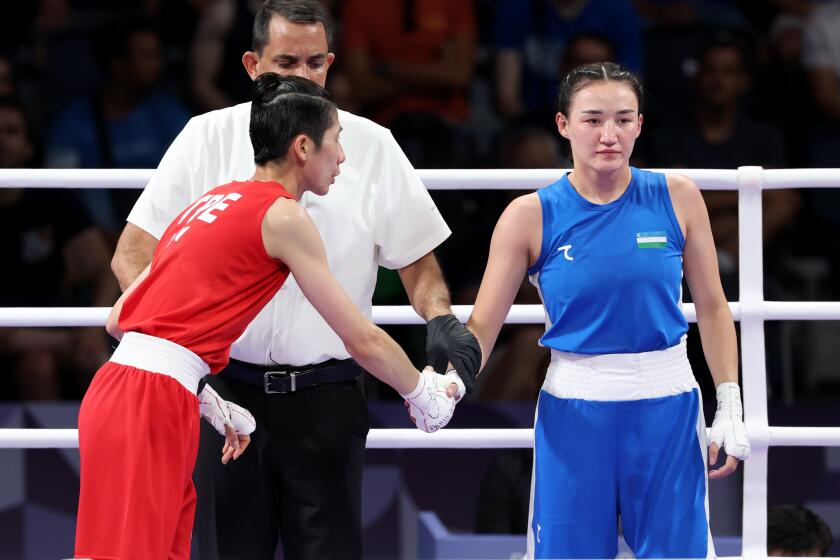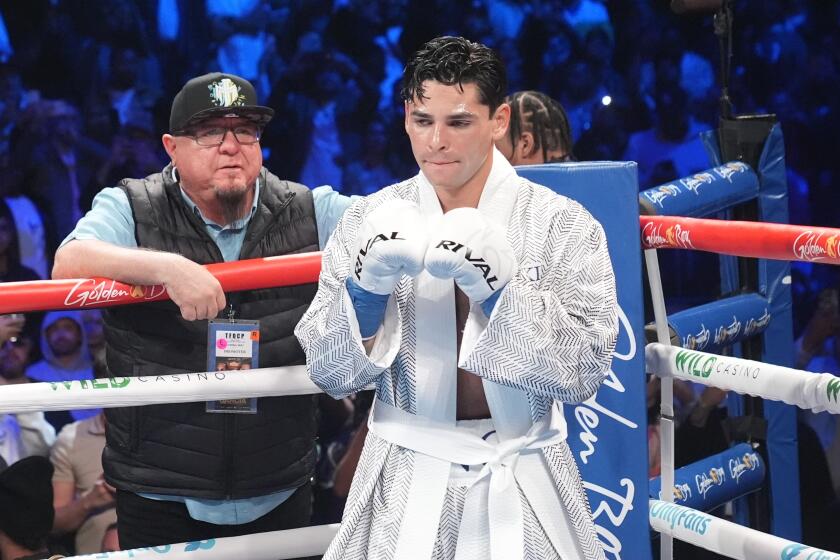He Has No Need for Flash, Just Cash : Boxing: Genaro Hernandez, who fights Oscar De La Hoya Saturday, isn’t ashamed to say that he’s in it purely for money.
By late afternoon, Genaro Hernandez has already traveled round-trip from his Mission Viejo cul-de-sac home to the cramped, sweat-soaked Brooklyn Gym, 50 miles into the heart of Los Angeles.
Home at last, Hernandez is tired and hungry, but dinner is delayed by an interviewer, and Hernandez’s 3-year-old daughter, Amanda, skitters around the house while the telephone rings repeatedly.
This is a normal scene for this most normal of championship fighters--what other major boxer motors around in a four-door sedan, complete with child-seat?--a sedate suburban vision come true after 25 years of hard times in South Central L.A.
This is the home he moved his family to three years ago, an airy, two-bedroom prize for 20 years of boxing. His wife, Lilliana, has taped a picture of him and his opponent Saturday, Oscar De La Hoya, to their bedroom mirror, “For inspiration in the morning,” she says.
Other fighters pose and roar and bleed for the cameras, but for Hernandez, on the cusp of the fight he has been waiting years to get, boxing is all about dollars and sensibility.
It’s about normal dreams and normal pains, not late-night escapades and the accouterments of luxury.
“People think I’m a millionaire, and I tell them, ‘If I was a millionaire, I wouldn’t be fighting,’ ” Hernandez says. “My brother asked me, ‘If you won the lottery, would you still be fighting?’ Because he’s into all this. I say, ‘Are you dumb or what? Of course not.
“I’m here to make money, not to get beat up. I play the real lottery, and I hope I win it.”
Says his wife: “He’s not in there because he likes it; he’s in there because he saw that as a way to make good money. Hopefully, he can wrap it up soon.”
Even though he expects to be the crowd favorite Saturday, Hernandez casually brushes off any idea that he is beloved by the Latino fight community.
This is a mature, 29-year-old man who shrugs when asked to respond to taunts from the De La Hoya camp that he is a boring fighter--”Generic Hernandez,” says De La Hoya--who draws few people to a bout.
“They’re going to be cheering for me only because I’m fighting Oscar,” Hernandez says. “A lot of people, they don’t like me that much. . . . But I think he’s gotten big-headed, and the people just want to see him go down. I’m their vehicle.”
Which, Hernandez acknowledges, has made Saturday a mini-lottery for him. He is scheduled to earn by far his largest purse, $500,000, to fight De La Hoya, 22, at Caesars Palace in Las Vegas.
Although Hernandez (32-0-1, 16 knockouts) has been a champion for 3 1/2 years and has successfully defended his title eight times, brittle hands and a technical, undramatic fight style have kept him from big-money fights.
Hernandez, who is promoted by Japanese businessman Akihiko Honda and has fought three times in Japan, had never made more than $160,000 before this fight.
“I still have to get in and get hit,” Hernandez says. “But it’s a big lottery for me. Where else would I make this money unless I fought Oscar?”
Hernandez is getting the payday, but losing his title. The World Boxing Assn. stripped him after deciding that De La Hoya was not a proper opponent.
He also must move up from his natural junior-lightweight division to De La Hoya’s comfortable lightweight limit of 135 pounds. Hernandez had never weighed more than 133 pounds before training for this bout.
“I worked so hard for the title,” Hernandez says. “I mean, it’s been a dream for me to own a title. And there are a lot of fighters out there who don’t win one.
“It just doesn’t seem fair. [The WBA] asked me to write a letter asking for permission. I wrote a letter. They give me permission, I sign the contract to fight Oscar. A week later they turn around and deny the permission.
“So, they can take the title, because the title’s not going to pay my bills. This fight is.”
After the struggle up the ladder and rigorous training and the battle to make more money and the multiple surgeries to his hands, Saturday is the end of a long quest for the Hernandezes.
A bit surprisingly, morning swimming exercises and a high-calorie diet have noticeably thickened his shoulder and back muscles, and for the first time in his career, Hernandez occasionally weighed more than 140 pounds before his brutal Brooklyn sparring sessions.
And lately, his hands, though never totally free of pain, have not been a major hindrance.
“At the time when he was suffering from the hands a lot, I would question, ‘Why is he in there?’ I just didn’t want to have to see him go through so many surgeries,” his wife says. “But, now, he’s been OK, he hasn’t been complaining.”
Lilliana Hernandez says these words earnestly and quietly, then laughs again.
“You know, I really think this fight is like ‘Rocky IV,’ ” she says. “You remember? The one where Rocky has to fight the big Russian fighter because he killed Rocky’s friend, and the Russian is training with all this fancy equipment and expensive methods, and Rocky is in a barn with nothing.
“That’s like Oscar, who has his own private gym and everything up in Big Bear, and Genaro, who’s at the Brooklyn Gym.”
Twice, when De La Hoya was fighting at 130 pounds, the Hernandez-De La Hoya fight was all but a done deal. It was a natural L.A. grudge match--the young glamorous, confident gold medalist with the power and speed, against the cagey, nearly invisible veteran champion.
The first time, in 1993, De La Hoya pulled out after suffering a hand injury. The second time, a year later, negotiations broke off when the Hernandez camp flatly refused a $300,000 offer, and resentment between the two camps has grown since.
“I knew I was worth more than $300,000,” Hernandez says. “I knew they wanted the fight, and eventually, they’d offer me more. And if they didn’t pay me more, forget it, it’s not worth it.”
Says Nori Takatani, Hernandez’s manager: “I always figured we’d fight De La Hoya, but I always thought we’d have to fight at Oscar’s natural weight, which is lightweight.”
Eventually, after Hernandez stopped Jorge Paez last March at The Pond of Anaheim at the end of eight choppy rounds, the De La Hoya camp was back on the line, negotiating again. In June of 1994, De La Hoya had blown out Paez in two rounds, which Hernandez surmises led De La Hoya to conclude that Hernandez would be no problem.
“I was so mad at Genaro when he turned $300,000 down,” Lilliana Hernandez says. “How could he do that? But I guess he knew what he was doing. I’m glad he did it now, but back then, I was very upset.”
The fighter himself, though, all but gave up on a De La Hoya fight at one point last year and publicly challenged anybody with a title from featherweight to lightweight.
How long could he wait to finally cash in?
“It was just frustration,” Hernandez says. “After eight title defenses, it was time to move on and get a good payday. I mean, I’m going to be 30 years old next year, and I’m trying to make as much money as possible, then get out.
“This is the biggest fight of my career. This is the fight that’s going to tell me if I’m going to be making bigger money or if I’m going to stay where I’m at. And I don’t want to stay where I’m at.”
But when Hernandez talks about De La Hoya, who has been earning more than $1 million per fight for almost a year now, he concedes that his own slow climb has helped keep him from a ballooning head.
“You know, I never thought I’d be world champion,” Hernandez says. “To me, I’ve got a beautiful house. It’s my castle. I’m never going to leave it. This is the first house I’ve ever had, and I struggled to get this house and I’ll never sell it.
“Everybody wants to make the money. But if it’s going to change me the way it changed Oscar, I don’t want it. Everybody that I talk to, they complain about the way he acts and the way he talks to people.
“Here’s what I’ve got, I’ve got two Camrys, I’m not out there driving a BMW or a Mercedes. Yeah, I could have had me a sports car, but you know, there’s no need for that. I’m a family man.”
Then, Amanda ambles into the room, drawing her father’s attention, and the $500,000 fighter turns into just another normal father.
“She’s seen me on TV, and she also knows who I’ll be fighting,” Hernandez says. “After I beat him, she knows how mommy will be--jumping up and down.”
More to Read
Go beyond the scoreboard
Get the latest on L.A.'s teams in the daily Sports Report newsletter.
You may occasionally receive promotional content from the Los Angeles Times.










